This post may contain affiliate links. Please read our disclosure policy.
Want some simple natural remedies for PMS you can start implementing today? Here are seven things that can help resolve the root cause of your PMS symptoms.

Struggling with PMS? You’re not alone. In fact, three in four women will experience PMS in their lifetime. While some women only experience mild PMS symptoms, others experience more severe PMS symptoms that make it hard to go to school or work.
Despite what most women are told, PMS is not just something you have to deal with as a woman. Your periods don’t have to suck, and you don’t have to be stuck taking hormonal birth control for the rest of your life to manage symptoms. There are many natural remedies for PMS that can relieve symptoms and make your monthly cycle a breeze.
Jump to:
What is PMS?
PMS stands for premenstrual syndrome. It’s a collection of physical, mental, and emotional symptoms that can occur up to 14 days before your period starts. Symptoms usually stop right when your period starts since both progesterone and estrogen levels drop to kick-start your monthly cycle. When PMS symptoms are debilitating and intense, it’s known as premenstrual dysphoric disorder (PMDD).
Your menstrual cycle is a vital sign. When PMS symptoms start to take over your life, it’s a sign that there is an underlying imbalance that needs to be addressed. This is where natural remedies for PMS can help!
Symptoms of PMS
Here are the most common symptoms of PMS:
- Bloating
- Cramps
- Nausea
- Constipation
- Hormonal acne
- Headaches
- Tender breasts
- Headaches
- Diarrhea
- Back pain or body aches
- Anxiety or nervousness
- Trouble sleeping
- Feeling sad
- Extreme mood changes
- Irritability or anger
- Changes in appetite
The Menstrual Cycle and PMS
PMS symptoms happen in the luteal phase of the menstrual cycle. Your menstrual cycle has four distinct phases, and in each phase, hormone levels change:
- Phase 1: Menstrual: This phase starts on day 1 of your period and can last anywhere from 3-6 days. Estrogen and progesterone are low.
- Phase 2: Follicular: Begins after menstruation, typically ends around day 12. Estrogen is slowing increasing.
- Phase 3: Ovulatory: Occurs around days 13-16 of your cycle. This phase lasts 3-4 days. Estrogen peaks, then drops right after ovulation.
- Phase 4: Luteal: Roughly days 17-28. This phase occurs after you ovulate, and ends right when you start menstruating. Progesterone rises and peaks. Estrogen rises again slightly, too. This is when PMS occurs.
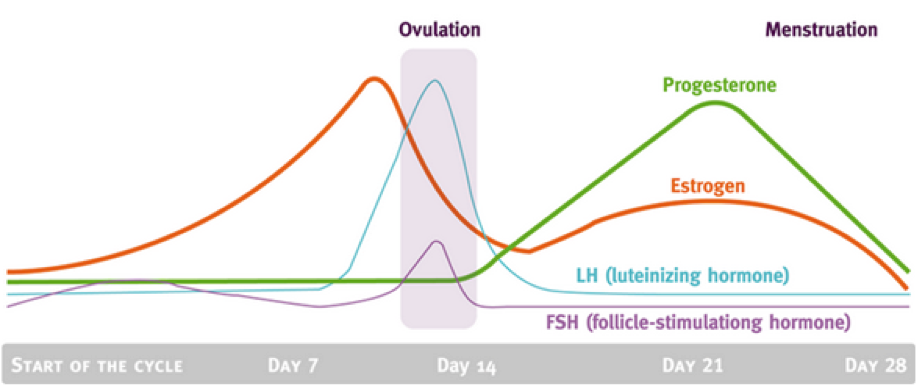
What Should A Healthy Period Look Like?
Before implementing natural remedies, it’s important to first understand what a healthy period looks like. There are three characteristics of a healthy period. Your period should:
- Arrive monthly. A bleed should happen every 21 to 35 days for adults and every 45 days for teens.
- Be pain free. Your mood, appetite, and energy may fluctuate, but your period should not cause severe pain or distress.
- Have normal bleeding. Bleeding should start and stop within seven days with little to no spotting. Blood loss shouldn’t be excessive—you shouldn’t be soaking through multiple tampons or pads in a day. A healthy period should have about 80 milliliters or 5 tablespoons over the entire bleed.
Natural Remedies For PMS
Focusing on natural remedies means considering your hormones, most notably estrogen and progesterone. Both are key players in your cycle and PMS symptoms.
- Estrogen: Estrogen helps to regulate your monthly cycle. There are three types of estrogen, and estradiol is the dominant form of estrogen. It is made in your ovarian follicles and drives the activity of the first half of your menstrual cycle. Spoiler alert: endocrine disruptors can act like estrogen and cause estrogen dominance, which can lead to PMS symptoms.
- Progesterone: Progesterone is a steroid hormone that is secreted by the corpus luteum. It’s actually made where the egg was released from the follicle during ovulation! Progesterone rises during the second half of the menstrual cycle after ovulation.
Why is this important? These hormones have an interdependent relationship. The surge of estrogen that happens prior to ovulation is necessary for the manufacture of progesterone. Ovulation must occur for progesterone levels to rise. So, if your estrogen levels are off or you aren’t ovulating, your progesterone levels will be imbalanced, likely causing PMS symptoms. This is why balancing hormones naturally plays a big part in resolving PMS.
What Causes PMS?
While hormones are involved, other factors may actually be at the root of the issue:
- Chronic stress and HPA axis dysfunction
- Chronic Inflammation (poor diet)
- Nutrient deficiencies (specifically magnesium, B vitamins, and fat soluble vitamins like A, D, E, and K2)
- Thyroid problems
- Chronic exposure to endocrine disruptors (through skin care, pesticides, and plastics)
- Blood sugar imbalances
Natural Remedies For PMS
Here are six natural remedies for PMS that can help bring relief to your symptoms long term:
1. Support Your Liver
Your liver breaks down hormones that have been used in the body to be eliminated. If your liver is overloaded with other toxins, it can inhibit estrogen detoxification.
- Avoid or limit alcohol. Alcohol puts a big strain on the liver, and impairs normal function.
- Eat leafy greens and cruciferous veggies daily. This is especially important during ovulation when estrogen peaks.
- Incorporate sulfur-rich foods daily. Sulfur is needed to produce glutathione, which is involved in detoxification. Examples include broccoli, pasture-raised eggs, garlic, and onions.
- Include foods rich in heme iron. Eat plenty of grass-fed meats, which are rich in heme iron and B vitamins.
- Consider milk thistle. Milk thistle is an herb that has active ingredients that may stimulate liver detoxification pathways and the regeneration of liver tissue.
2. Eat Diversely
Following an anti-inflammatory diet rich in fruits, vegetables, and high-quality protein including grass-fed meats, fish, and eggs must be a part of any treatment plan for PMS. A nutrient-dense diet will support proper gut and liver function, and provide the body with essential micronutrients needed for proper hormone balance.
Eating high quality protein and fat with each meal, and add at least 1-2 servings of fresh fruits and vegetables with each meal. Don’t try to reduce calories, which will leave you hungry and frustrated. Simply try to improve quality!
You may also need to do an elimination diet to see if any specific foods are making your PMS worse. I recommend doing a 8-week elimination protocol (at least two cycles) that removes gluten, dairy, vegetable oils, and processed sugar. Then, bring back in foods one at a time to see how your body responds. Use my recipe index for recipe ideas!
3. Reduce Stress
Perhaps the most important thing you need to do is identify and reduce sources of chronic stress in your life. You MUST manage stress for hormones to be in balance.
Our master stress hormone, cortisol, is secreted anytime you are under stress. It doesn’t matter if it’s a work deadline, traffic, or unresolved trauma. Chronic cortisol production impacts your entire endocrine system, and can inhibit progesterone levels.
Identify causes of chronic stress, and reduce them. Some common forms of chronic stress include:
- Overpacked work and family schedules
- Undereating, fasting, and chronic dieting,
- Overexercising
- Unresolved trauma,
- Innsufficient sleep
- Excess alcohol and/or caffeine consumption
- Undiagnosed or unmanaged food sensitivity
- Chronic infections
- Thyroid problems
- Chronic exposure to blue light
- Lack of sunshine/low vitamin D
4. Take Magnesium
Up to 80% of people are deficient in magnesium. Magnesium is critical for supporting the stress response, and is the catalyst for over 300 reactions in the body that connect to proper detoxification, energy production, and even digestion. Women are much more prone to magnesium deficiency because it’s depleted during times of stress and pregnancy.
Research shows magnesium supplements can reduce PMS symptoms, and that it works even better when paired with vitamin B6! It’s also been shown to help mood disorders. I recommend taking a high quality combination magnesium supplement, like Well Minerals More Chill Magnesium, especially if you struggle with sleep as a symptom of PMS.
5. Exercise Consistently
While exercise may not be at the top of your list when dealing with PMS, it’s actually one of the best things you can do. Studies show that regular aerobic exercise significantly reduces PMS symptoms such as bloating and moodiness.
Exercise also improve insulin sensitivity, which has a positive impact on blood sugar regulation and inflammation. Studies show it also improves anxiety and depression, which can increase during PMS. Exercise relieves stress, improves sleep, and boosts your overall mood. In short, exercise is the golden ticket to improving PMS—no matter what your root cause!
6. Manage Circadian Rhythms
This is just a sneaky way of saying you MUST get to bed before 11pm, and you need to prioritize sleeping at least 7-8 hours a night. Most women are not sleeping enough, which can directly impact stress, your adrenal health, and therefore hormonal balance. Lack of sleep can increase cortisol levels and lead to insulin resistance. You will not be able to balance hormones long-term without prioritizing your sleep.
Does Hormonal Birth Control Fix PMS?
While the hormonal birth control may help to alleviate PMS symptoms in the short term, it can actually make symptoms worse long term.
The pill works by stopping ovulation and shutting down your own hormone production. Even if you bleed and have a period on hormonal birth control, you’re not ovulating.
Many women use hormonal birth control to manage symptoms like heavy periods and hormonal acne, but the pill only masks symptoms and exacerbates the problem. It does not treat the root cause of hormone imbalances.
Treating PMS Naturally
The bottom line: Your periods shouldn’t be painful. You don’t have to suffer monthly with PMS, or accept it as part of being a woman. I want you to feel empowered knowing that there are natural remedies for PMS, and you can make small changes that will benefit your body as a whole and set you up for success long term.
More Articles:
- Natural Treatments for PMDD
- HPA Axis Dysfunction: Symptoms, Causes, and Treatment
- How to Balance Hormones Naturally
- Natural Remedies for Perimenopause Symptoms
- Estrogen Dominance: Symptoms, Treatment, & Supplements
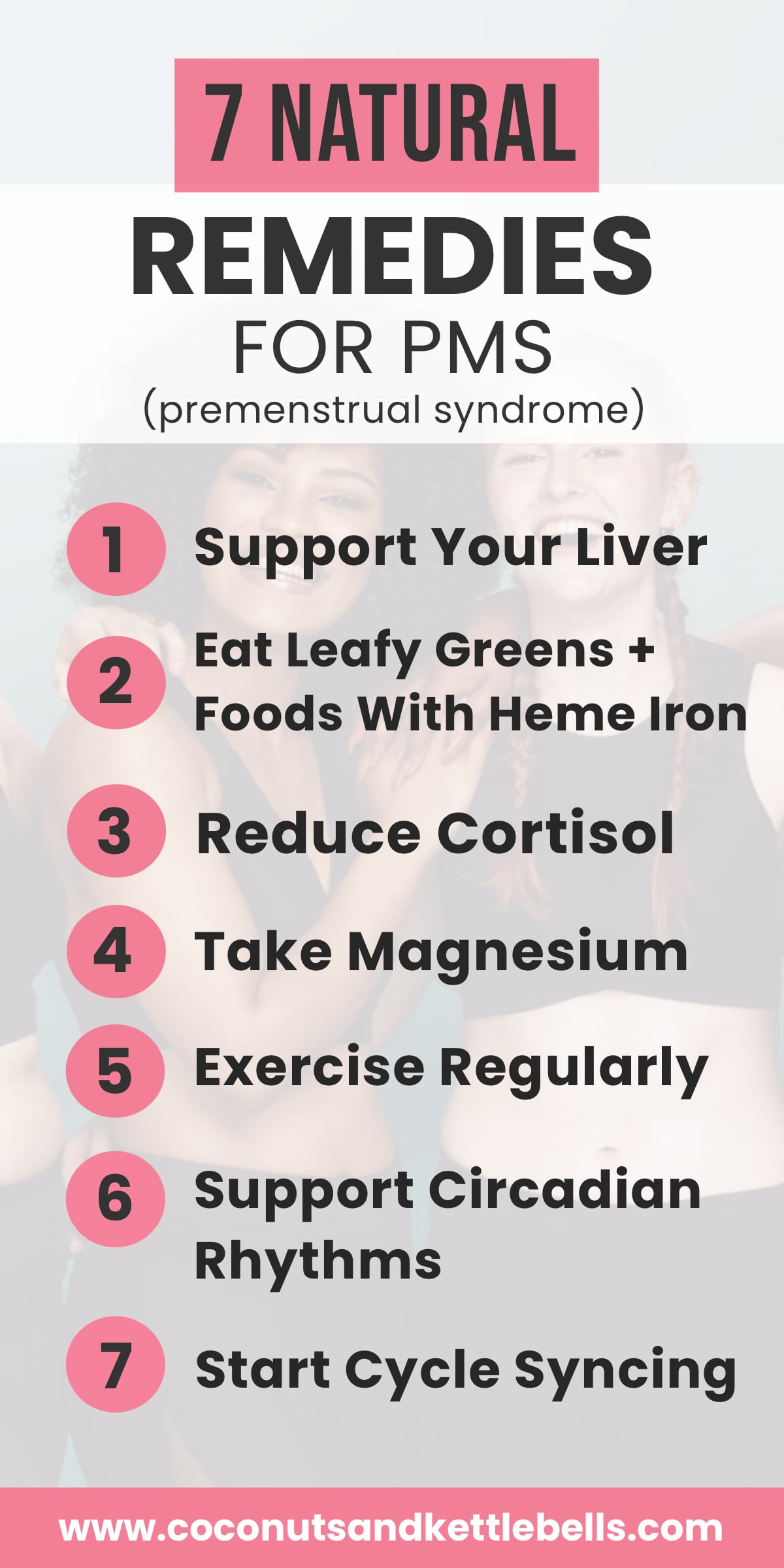
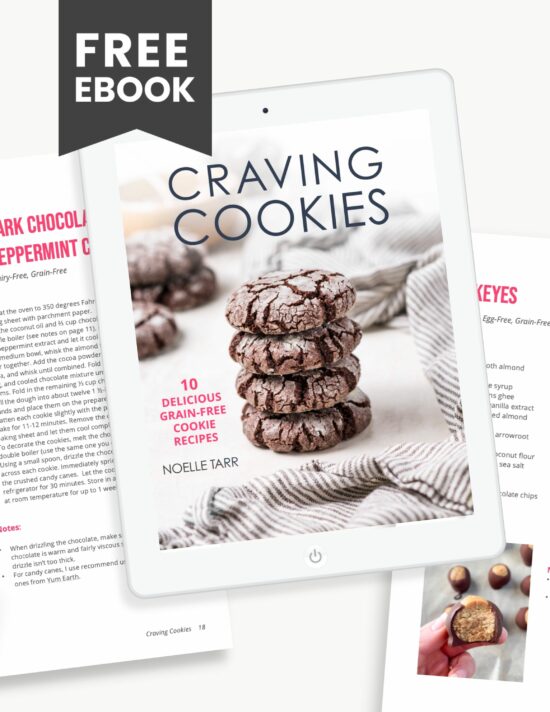
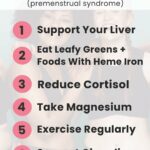
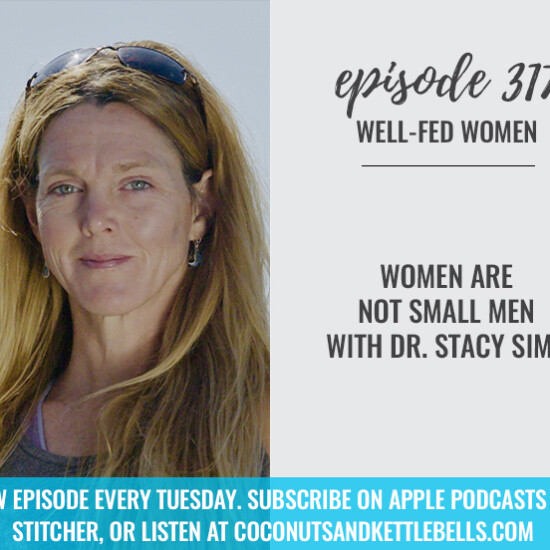
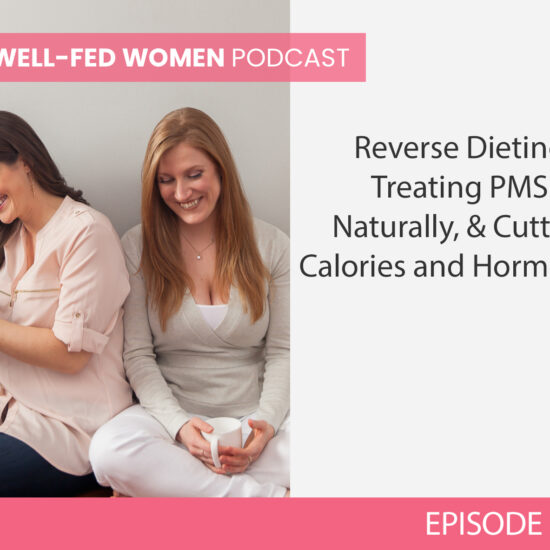
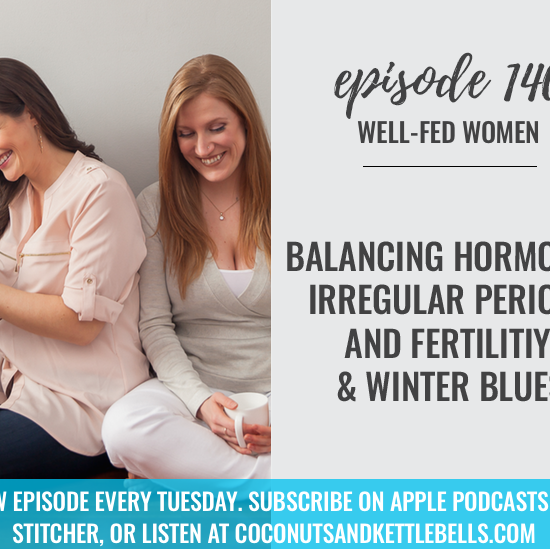
Lauren Lewis says
I’m curious what type of birth control you use? I’m done having children, and definitely do not want to chance a possibility ha!